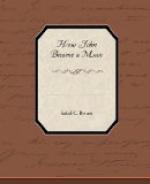“Does He hear all the words we say?” asked little John in an awed tone, quite unable to comprehend his father’s meaning, “and does He look at us when we are asleep?”
“Yes,” his father answered; “God sees and knows everything. Now, I will tell you the short prayer that I used to say when I was a little boy like you—the prayer that my mother taught me.”
Thus it was that John, kneeling beside his little bed repeated the prayer that has been lisped by thousands of other baby voices:
“Now I lay me down to sleep;
I pray thee, Lord, my soul to keep.
If I should die before I wake,
I pray thee, Lord, my soul to take.”
As the days and weeks sped by, John thought often of his dear mama and wished that he might see her; but he as often would recall his father’s words to be a little man, and with all his strength he endeavored to be what he considered a man ought to be. But although he tried, in his childish way, to be one, he was often very lonely; and had it not been for frequent visits to his uncle’s home, several miles distant, he would have missed his precious mother even more than he did. While at his uncle’s, he could play with his two cousins, Will and Charley. At last it was decided that it would be best for John and his father to go and make their home with the uncle until John was older.
Now Charley was just about John’s age; but as Charley was a cripple, John had chosen Will, who was several years the oldest, to be his closest friend and companion. Regardless of these facts, however, the three boys generally played together. Their playground was the vast dooryard extending far out over the prairie.
In time they were given the responsibility of herding the cows. To herd the cows meant to see that the cattle did not wander about in the neighborhood corn, wheat, and barley fields that were scattered about here and there over the prairies and that were in but few instances fenced, and to see that they were driven to some water-place at certain intervals and were brought home at the milking hour.
The watering places were known as “buffalo-wallows,” for they had been made by the buffalos in wallowing. These basins were usually kept filled with water by the rains. Some of the “wallows,” or “ponds,” were rather deep, and were treacherous because of sudden “drop-offs”; but they were usually shallow, and it was generally safe for the children to play along the edge.
After the first sharp edge of his grief was dulled, John’s father did not feel it so keenly his duty to instruct his child and to teach him to reverence his Creator; and when John was about six years of age, the father was kept so busy with his work that he had but little time to spend with the child. John’s aunt, too, although a good woman, was too much occupied with housekeeping to do her duty by her own two boys, much less by a third. So John and his cousins had spent nearly all of the three years that they had been together in doing as they pleased, and in finding as much enjoyment in living as it was possible for them to find. It was, therefore, not strange that they had learned and invented many new ways to get amusement, and that some of these were evil; for Satan, as he always does in such cases, had lent them a helping hand.




